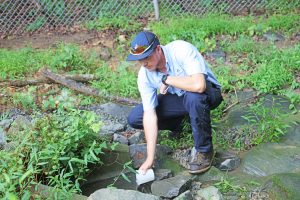Fieldwork is one of the most exciting things about working for water. Getting out of the laboratory or treatment facility and into the field gives you the chance to apply your knowledge to better understand factors affecting the environment and public health while also enjoying some sun and fresh air.
However, effective fieldwork requires thorough preparation to make your trips into the field as smooth and productive as possible. Understanding how to prepare for fieldwork, such as what to pack and ways to curb physical stress, is crucial whether you undertake fieldwork every day or only a few times in your career.
Keep these basic tips in mind while preparing to venture into the field.
Packing and Preparation
Before you travel for fieldwork — even if you’re traveling nearby — you’ll need equipment that ensures you’ll be safe. Aside from first aid kits, flashlights, and other basic supplies, the Environmental Health and Safety staff at Portland (Ore.) State University recommends double-checking modes of transportation such as vehicles or planes to make sure they’re able to handle the trip. Ensure that your transportation has enough space for the number of people and the volume of equipment you plan to bring. If your destination is remote, make sure your transportation has sufficient off-road capabilities to travel safely. In unfamiliar areas, devices with global positioning system (GPS) capabilities are extremely useful, but don’t leave the traditional paper maps behind.

Whether you undertake field work every day or just a few times in your career, follow these basic tips to make the most out of your trips out of the water resource recovery facility. Image courtesy of Kipp Hanley/Prince William County Service Authority
You will also want to coordinate with local authorities to be aware of any health hazards in the area, as well as in the specific area you’ll be visiting. If you’re collecting water samples, for example, you’ll need to know if there are dangerous rocks in the area or if high tide comes particularly early. Additionally, research whether your study area hosts any potentially hazardous plants and animals – be sure you can identify these hazards when you see them, know how to address dangerous wildlife situations, and keep your disturbance to the habitat to a minimum.
Use the buddy system whenever possible, but at a minimum, ensure others know where you are and when you are expected to return home.
You should aim to pack functional clothing that won’t get in the way of your work as well as sturdy shoes in case you need to trek. Lightweight clothes are key, as thick sweaters and tight-fitting pants will restrict your movements and potentially tire you out even faster than usual. Don’t forget to bring a set of standard personal protective equipment that includes safety goggles, gloves, and a hart hat, as well as any other safety gear you may need for your study area. You’ll also want to carry a hat and sunglasses to help protect you from the sun.
Health and Safety Above All
The first step to curbing physical stress is to know when and how it crops up. An article posted by Pain Free Working on standing at work highlights that although people in desk jobs may benefit from standing up once in a while, standing for too long can lead to chronic back pain. This is because you’re putting a lot of tension in your lower back and joints to keep you up and moving. The problem with standing too much is that the effects tend to manifest much later, which is why as a general rule you should take periodic sitting breaks while in the field. These sitting breaks can be times when you write your observations or log data.
When working near or with water, you should always err on the safe side and assume that the water is polluted. Having this in the back of your mind will remind you to always wear gloves, disinfect after handling each sample, and avoid rubbing your eyes before washing your hands. You should also be using waders to help protect your feet from whatever’s in the water. Be sure to remove your waders before washing your hands.
While it’s important to keep hydrated during your fieldwork (and you should be bringing a water bottle with you), remember to thoroughly disinfect before taking even a little sip. As a precaution for the worst-case scenario, be sure you know the location of the nearest hospital or medical care facility and have a way to get there.
Undertaking fieldwork can lead to critical insights that may be impossible to gather from within a laboratory or water resource recovery facility. But even more important than collecting data is preserving your own health and safety as well as that of your team.
Visit the U.S. Geological Survey National Field Manual for the Collection of Water-Quality Data for more helpful tips on getting the most out of your fieldwork trips.
— JBedster, Guest Contributor








January 28, 2020
Learning Opps